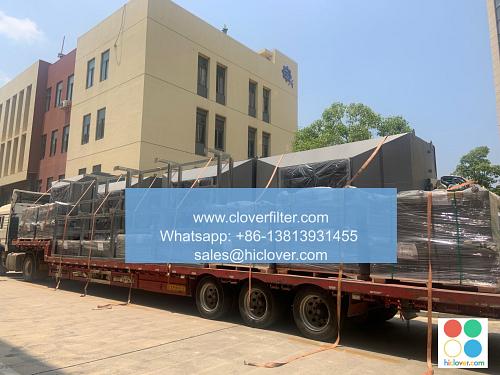The Importance of Automatic Roll Air Filters in Pharmaceutical Facilities

Pharmaceutical facilities require a high level of cleanliness and air quality to ensure the production of safe and effective medications. One crucial aspect of maintaining a clean environment is the use of air filtration systems. Among the various types of air filters available, automatic roll air filters have gained popularity in recent years due to their numerous benefits. In this article, we will discuss the importance of automatic roll air filters in pharmaceutical facilities.
Airborne contaminants, such as dust, pollen, and microorganisms, can compromise the quality of pharmaceutical products and pose a risk to public health. Automatic roll air filters are designed to capture these contaminants, providing a clean and sterile environment for manufacturing and packaging. These filters use a rolling mechanism to advance a new section of filter media as the old one becomes saturated, ensuring a consistent and high level of air quality.
One of the primary advantages of automatic roll air filters is their ability to maintain a consistent air flow rate. This is critical in pharmaceutical facilities, where air flow rates must be precisely controlled to prevent contamination and ensure the accurate filling of containers. Automatic roll air filters can be adjusted to meet specific air flow requirements, making them an ideal solution for facilities with varying airflow needs.
Another benefit of automatic roll air filters is their low maintenance requirements. Unlike traditional air filters, which must be manually replaced and disposed of, automatic roll air filters can be easily advanced to a new section of filter media, reducing labor costs and minimizing waste. This also reduces the risk of human error, which can compromise air quality and contaminate products.
Furthermore, automatic roll air filters are designed to minimize the risk of filter bypass, which occurs when contaminants pass through gaps between the filter and the surrounding frame. This can be a significant problem in pharmaceutical facilities, where even small amounts of contaminants can compromise product quality. Automatic roll air filters use a secure sealing mechanism to prevent filter bypass, ensuring that all airborne contaminants are captured and removed from the air stream.
In addition to their technical benefits, automatic roll air filters also offer economic advantages. By reducing labor costs and minimizing waste, these filters can help pharmaceutical facilities reduce their operating expenses. Additionally, automatic roll air filters can extend the life of other equipment, such as HVAC systems, by reducing the amount of contaminants that enter the system.
The use of automatic roll air filters is also supported by regulatory agencies, such as the FDA and ISO. These organizations have established strict guidelines for air quality in pharmaceutical facilities, and automatic roll air filters can help facilities meet these requirements. By using automatic roll air filters, pharmaceutical facilities can demonstrate their commitment to quality and compliance, reducing the risk of regulatory issues and product recalls.
In conclusion, automatic roll air filters play a critical role in maintaining the cleanliness and air quality of pharmaceutical facilities. Their ability to capture airborne contaminants, maintain consistent air flow rates, and minimize filter bypass makes them an essential component of any pharmaceutical air filtration system. By reducing labor costs, minimizing waste, and extending equipment life, automatic roll air filters can also help facilities reduce their operating expenses. As the pharmaceutical industry continues to evolve, the importance of automatic roll air filters will only continue to grow.
FAQs
Q: What is the primary benefit of automatic roll air filters in pharmaceutical facilities?
A: The primary benefit of automatic roll air filters is their ability to capture airborne contaminants, providing a clean and sterile environment for manufacturing and packaging.
Q: How do automatic roll air filters maintain consistent air flow rates?
A: Automatic roll air filters use a rolling mechanism to advance a new section of filter media as the old one becomes saturated, ensuring a consistent and high level of air quality.
Q: What is filter bypass, and how do automatic roll air filters prevent it?
A: Filter bypass occurs when contaminants pass through gaps between the filter and the surrounding frame. Automatic roll air filters use a secure sealing mechanism to prevent filter bypass, ensuring that all airborne contaminants are captured and removed from the air stream.
Q: Are automatic roll air filters supported by regulatory agencies?
A: Yes, the use of automatic roll air filters is supported by regulatory agencies, such as the FDA and ISO, which have established strict guidelines for air quality in pharmaceutical facilities.
Q: Can automatic roll air filters help reduce operating expenses in pharmaceutical facilities?
A: Yes, automatic roll air filters can help reduce labor costs, minimize waste, and extend equipment life, resulting in lower operating expenses for pharmaceutical facilities.

